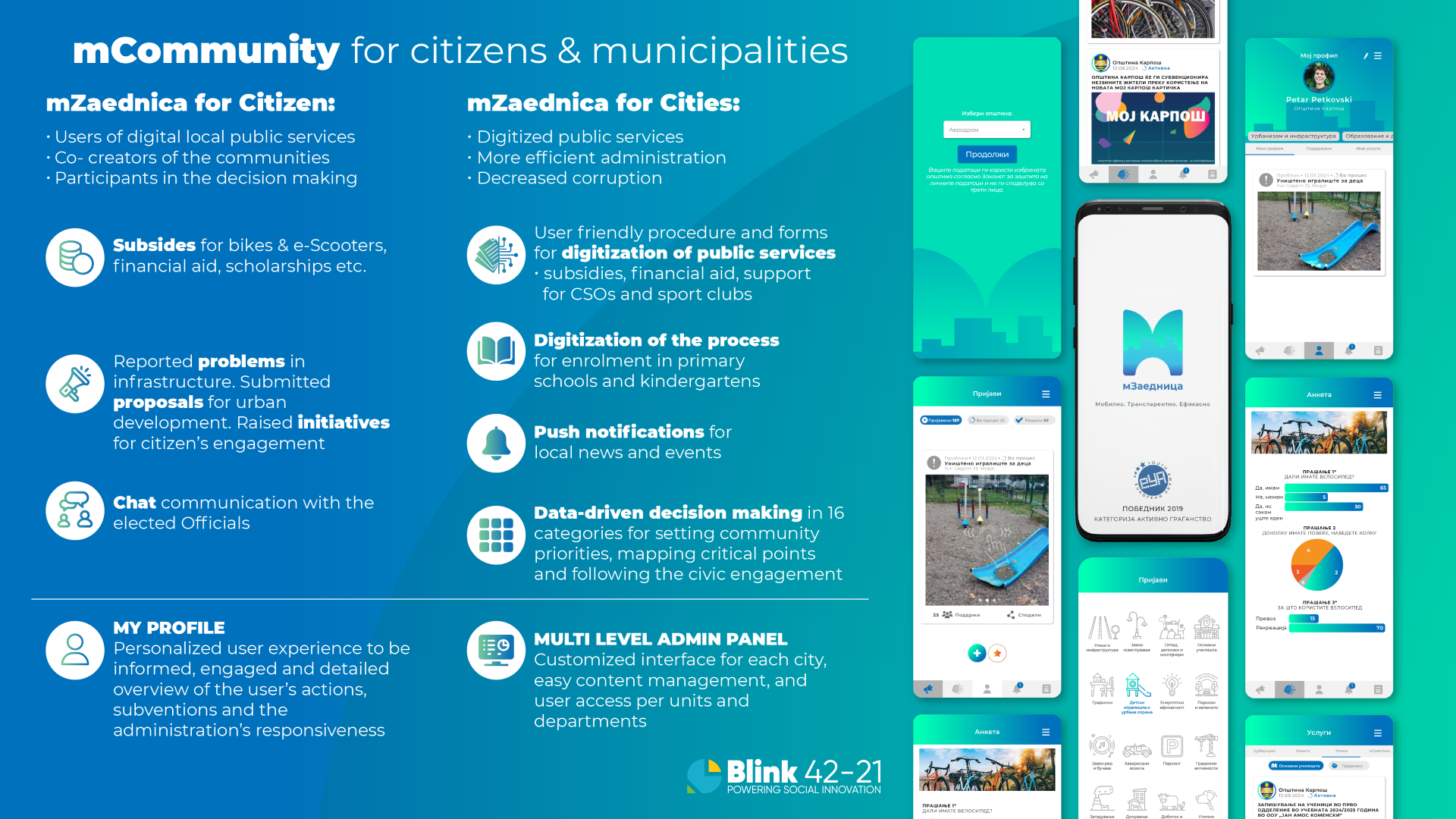
mCommunity: Rebuilding Trust Between Citizens and Municipalities
In 2018, the Centre for Social Innovations Blink 42-21 launched mCommunity, a mobile app built on the bold idea that digital technology could bridge the growing gap between citizens and institutions. Just a year later, it received the European Youth Award for Best Digital Solution in Active Citizenship—but that was only the beginning.
What started as a prototype for mobile participation has since evolved into a full-scale, multilingual digital platform used by ten municipalities across North Macedonia and piloted in Albania for the first time in 2025. Whether via mobile or web, mCommunity enables municipalities to digitise public services, engage citizens in two-way communication, and prioritise community needs in real time.
“We didn’t just build an app,” says Milan Tancheski, co-founder of Blink 42-21. “We built a channel of trust — something that transforms citizen concerns into civic action and helps municipalities become more open, responsive, and aligned with real community priorities.”
A Platform for Participation, Transparency, and Accountability
Through mCommunity, citizens are no longer passive recipients of public services — they become co-creators of their communities. They can report infrastructure problems, propose ideas for urban development, raise initiatives, apply for subsidies and scholarships, or enrol their children in kindergartens. Direct chat communication with elected officials fosters open dialogue and responsiveness.
Crucially, citizens can not only submit posts but also comment on and support proposals made by others. Every week, dozens of new posts and discussions unfold inside the platform, transforming individual concerns into collective action. This collaborative approach allows municipalities to identify and respond to real community priorities faster and more transparently.
Municipalities, in turn, benefit from a digitised administrative system, streamlined service delivery, and real-time insights into citizen needs. mCommunity offers user-friendly tools such as a multi-level administrative panel, integrated digital forms, and customised communication features that make local governance more efficient and inclusive.
Beyond facilitating communication, mCommunity serves as a dynamic engine for data-driven decision-making. Every citizen interaction, whether reporting an issue, submitting a proposal, or engaging in discussions, generates valuable real-time data that municipalities can harness to better understand community needs. Through the platform’s analytics and reporting tools, local governments can monitor trends, measure support for various initiatives, and identify emerging challenges early.
This citizen-generated data empowers municipalities to move beyond intuition and make evidence-based policy decisions, prioritise resources more effectively, and design services that truly reflect their residents’ evolving priorities. The transparency created by these open digital processes also helps decrease opportunities for corruption, reinforcing public trust.
The adoption of mCommunity has brought visible change across participating cities. Today, over 10K active citizens use the platform to interact directly with their local governments, not just to apply for services or receive notifications, but to shape the future of their communities actively.
Between 40 and 60 new posts are published every week, and other users react, comment, and support proposals, turning individual actions into community-driven priorities.
Municipalities that embraced this model are now recognised among the country’s leaders in transparency and integrity. Cities like Valandovo, Kriva Palanka, Kocani, and Aerodrom have seen their Openness Index rankings rise significantly, demonstrating that investing in citizen participation leads to stronger, more trusted institutions.
“mCommunity has significantly enhanced our capacity to communicate with citizens and involve them directly in identifying and addressing local priorities,” says Mr. Pero Kostadinov, Mayor of Valandovo. “Through this platform, we’ve opened new channels for dialogue, increased transparency in our work, and empowered residents to take an active role in shaping our municipality’s future. It’s a vital step toward more inclusive, accountable, and citizen-oriented local governance.”
Making Everyday Life Simpler
Through mCommunity, accessing local government services has become simpler, faster, and more transparent. Citizens no longer have to navigate complex bureaucratic procedures or endure long waiting times; they can now apply for services, voice concerns, and contribute to community decisions through a simple, accessible interface.
“People are ready to engage,” Milan adds. “They just need the right tools, ones that are accessible and designed with their needs in mind.”
By embedding participation into everyday life, mCommunity strengthens the relationship between citizens and institutions, turning civic engagement into a visible, impactful reality.
With its first cross-border implementation in Fushe Arres, Albania, mCommunity is now proving that local innovation can inspire regional change. It is not just a platform — it is a model for how civic technology can rebuild public trust, empower citizens, and reinforce democratic values through inclusive digital engagement.
As Blink 42-21 continues to develop scalable, human-centred tech solutions, mCommunity stands as a leading example of how digital participation can transform local governance, moving from reactive administration to proactive collaboration, and from local trust-building to regional impact.
